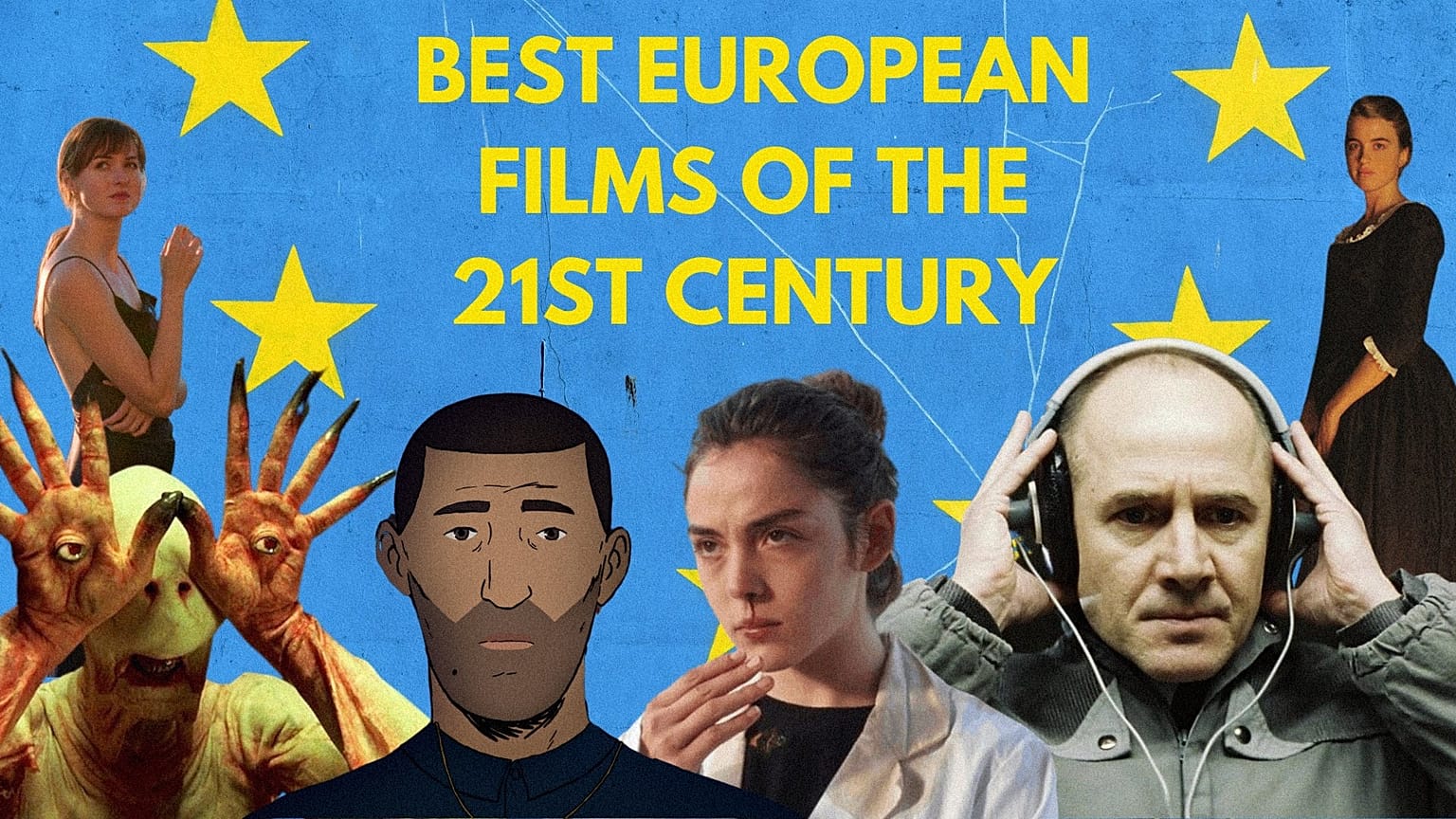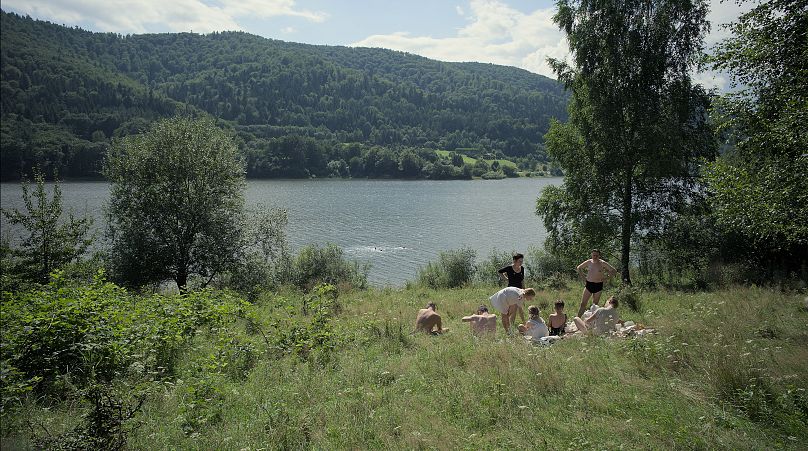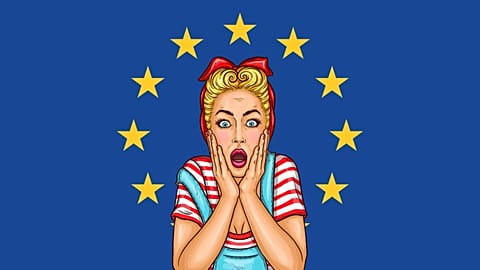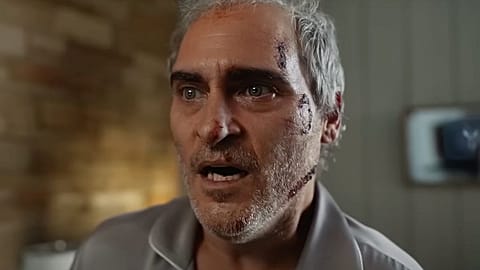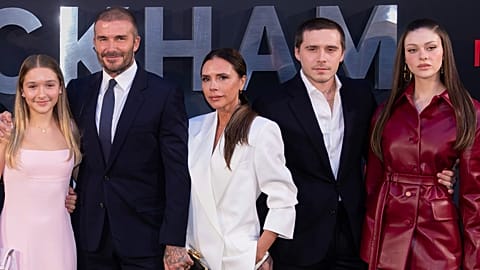How many have you seen?
This year's Cannes Film Festival is over and the vintage edition saw a French film, Justine Triet's Anatomie d'une chute (Anatomy of a Fall), win the coveted Palme d'Or.
So, now that we've just about recovered and are basking in the light of a thriving European film scene, what better time than to take a look back and rank our favourite European movies of this still very young century?
To do so, the Euronews Culture team adhered to three simple rules:
- The European productions must have been released between 2000 and today.
- Shorts and medium-length films are not eligible.
- No director can appear more than once.
So, without further ado, here are the Top 30 European films of the 21st century, which includes a fresh entry from one of this year's Cannes line-up. Read on to find out which...
30) Turist (Force Majeure)
D: Ruben Östlund (Sweden, France, Norway, Denmark, Italy - 2014)
Having won two Palme d’Or awards in the space of five years (for 2017’s The Square and 2022’s Triangle of Sadness), Swedish filmmaker Ruben Östlund has become something of a phenomenon in recent years, excelling in probing the quirks and absurdities of modern society with acerbic wit. Östlund’s Force Majeure was the film that revealed him on an international stage as a talent to follow closely. His fourth film tells the story of a Swedish family on holiday in the French Alps and how the father comes to personify the phrase “Every man for himself” when he saves his own skin during an avalanche, while his wife calls to him and attempts to protect their children. It’s a dark comedy that delves into the human condition, as well as honestly depicting the complex dynamics of relationships and the societal expectations around traditional gender roles. Acidic and piercing in the way it breaks down the façade of masculinity, this 2014 film was superior in every conceivable way to the dire American 2020 remake – which only served to show the mind-numbing pointlessness of remaking already flawless films because Western audiences can't stomach what Parasite filmmaker Bong Joon-Ho called “the one-inch-tall barrier of subtitles”. Force Majeure is, well, a textbook case of nominative determinism. David Mouriquand
29) Elle
D: Paul Verhoeven (Netherlands, Germany, France, Belgium – 2016)
Elle is the thrillingly subversive and knotty late-career masterpiece from Dutch provocateur Paul Verhoeven, and few films since its 2016 release have had the same disorientating and brutally honest look at sexual trauma. Based on the 2012 novel ‘Oh...’ by Philippe Djian, this incendiary psychological drama stars Isabelle Huppert as an accomplished video game producer who is raped in her home by a masked assailant. She decides not to report the crime due to her past experience with the police and is determined not to play the victim. She just nonchalantly mentions the incident to her bourgeois friends over a posh dinner a few days later. In parallel, our inscrutable protagonist takes the time to grapple with how the sexual assault intersects with her sexual desires, whilst leading her own investigation into who the assailant might be. Few filmmakers would have been brave enough to take on this provocative project, but Dutch enfant terrible Verhoeven was the perfect fit. His film – brilliantly scripted by David Birke – works as a devilishly unpredictable anti-revenge drama, a satirical black comedy, and a character study that leaves no one indifferent. DM
28) Verdens verste menneske (The Worst Person in the World)
D: Joachim Trier (Norway, Sweden, Denmark, France – 2021)
At times, life can feel like a tumultuous affair, a seemingly endless maze of confusion and uncertainty. Yet, in Joachim Trier’s gorgeous Norwegian coming-of-age film The Worst Person in the World, the chaos of existence is embraced with a rare sense of comfort and understanding. Playing out over 12 chapters (with a prologue and an epilogue), the film follows the character of Julie (Renate Reinsve), a restless young millennial approaching 30, who is grappling with the daunting task of finding her place in the world. It’s a story that everyone can relate to, from the subtle nuances of relationships or the high and lows of self-discovery. Trier navigates these complex themes with a delicate touch, avoiding any form of judgement or overt persuasion. Instead, he lets the audience form their own conclusions about the characters on screen, making its overall message all the more powerful. It would be very hard not to fall for the irresistible charm of this brilliantly hilarious, profoundly moving, and deeply heartfelt film. Theo Farrant
27) Lazzaro felice (Happy as Lazzaro)
D: Alice Rohrwacher (Italy, Switzerland, France, Germany - 2018)
Happy as Lazzaro is a study on the power of ignorance. Lazzaro is a young man living in a primitive agrarian society in the Italian countryside. Ruled over by a cruel landlord, Lazzaro’s community works their farmland tirelessly to pay their dues to the village’s Marchioness and Estate Manager. When the Marchioness’s son, Tancredi, befriends Lazarro, they decide to prank the village by faking his disappearance. Lazzaro’s kind-hearted but absent persona makes him a vital foil to his friend’s devious plan. In keeping with the themes, it’s best to go in blind and so feel free to skip to the next film in the list if you haven’t seen it. For those that have, they will know that the plan backfires and a contemporary police force is called to help find Tancredi who reveal that the village is being illegally held in an artificial time stasis under feudal practices. Magically, the innocent Lazzaro is propelled into the future, where his unjudging eyes witness how his community, when brought into the modern world have not been freed of their bondage but placed into a new perilous situation suffering in their adaptation to capitalism. Happy as Lazzaro could easily have devolved into a morose study if not for the beautifully painted characters and astounding imagery Rohrwacher bathes the film in. Jonny Walfisz
26) Four Lions
D: Chris Morris (UK – 2010)
An incompetent group of jihadis from Sheffield, England, decide to become suicide bombers in this black comedy from king of British satire, Chris Morris (Nathan Barley, Brass Eye, Jam). While hilarious at points (“Rubber Dinghy Rapids Bro”) and deeply disturbing at others, Four Lions is an uncomfortably poignant look at British society, culture and the humanity behind ‘War on Terror’ headlines. The plot follows Omar (Riz Ahmed), a seemingly quiet and conventional family man who harbours deep-seated anger and resentment towards Western society; witless Waj (Kayvan Novak), Omar’s child-like cousin who takes pictures of his “confused face” to make sure he is confused; Barry (Nigel Lindsay), a rageful and reckless Islam convert, and the ingenuous Faisal (Adeel Akhtar) who can't blow a crow up right, let alone himself. Despite dealing with such a sensitive subject, the film skilfully balances its satirical tone with sympathetic subtleties, depicting the delusion and draw of radicalisation in those left rudderless on the outer fringes of society. It’s British black comedy at its best, unafraid to explore “taboo” topics - as seen with Morris’ controversial 2001 Brass Eye special ‘Paedogeddon’ - and careful to craft its characters with dimension, any hilarity rooted in the strangeness of reality rather than stereotypes. It's a tribute to what great writing can do, along with the film's enduring quotability: “Is a Wookie a bear, Control?" Amber Bryce
25) I, Daniel Blake
D: Ken Loach (UK, France, Belgium - 2016)
Ken Loach has always made angry films. This is no exception. Winning the director his second Palme D’Or at Cannes after his searing interrogation of the traumatic 1992 transition from the Irish War of Independence into the Irish Civil War in 2006's The Wind That Shakes the Barley, Loach’s 2016 film I, Daniel Blake takes aim at the British welfare system failing the public. Daniel Blake, played with incredible sensitivity by Dave Johns, is an ageing working class man from Newcastle who has been barred from working after a heart attack by his doctors. As a bureaucratic government system decides he is “fit to work”, he can’t receive benefits. Daniel is put in an impossible financial situation as he faces abject poverty. Yet, his kindness never wavers as he befriends a young mother who has also been shut out of benefits. Loach’s film is stark, drawing on his rightful fury at a system designed to cruelly exclude. Beyond the accolades at Cannes, the film’s true legacy is the work Loach and producers did to push the message to Conservative politicians of the reality of poverty in the UK. JW
24) Låt den rätte komma in (Let The Right One In)
D: Tomas Alfredson (Sweden – 2008)
Vampires have done well for themselves on the international scene this century. Maybe not quite as well as zombies, but from True Blood to The Twilight saga, via the brilliant What We Do in the Shadows (and its hysterical TV adaptation) and arthouse gems such as Ana Lily Amirpour’s A Girl Walks Home Alone at Night and Jim Jarmusch’s Only Lovers Left Alive, there’s been a steady appetite for the mythical bloodsucking creatures. The less said about Morbius, the better. On the European front, Swedish film director Tomas Alfredson made the most memorable impact on the vampire scene with his film adaptation of John Ajvide Lindqvist’s 2004 vampire novel 'Let The Right One In'. What sets this film apart is how it avoids binaries of good / evil, hunter / prey and instead offers a deceptively profound horror film full of heart, which also takes the time to paint the portrait of Sweden’s marginalised. The tale of bullied outcast Oskar (Kåre Hedebrant) set in a 1980s Sweden also offers up all of the classic vampire lore (folk-legend approved conventions, not the tired Hollywood revisionism), but they are observed in fascinating ways through the “young” Eli (Lina Leandersson), who anchors what is essentially a doomed boy-meets-girl love story. Well, boy-meets-girl-who-isn’t-a-girl-at-all-but-boy-doesn’t-care…yet, to be more precise. And rare are films which, in their last minutes, offer a subtle resolution that both ties up all the themes and simultaneously delivers a gut-punch reveal about what it’s all really been leading to: the terrible price that comes in transactional relationships, regardless of love. DM
23) 120 BPM
D: Robin Campillo (France - 2017)
Media covering individual struggles through HIV/AIDS epidemic of the 80s and 90s have increased in recent years, from the excellent Russell T. Davies TV drama It’s A Sin to the phenomenal Tony and Olivier-award winning play The Inheritance by Matthew Lopez. Where Moroccan-born French director Robin Campillo’s 120 BPM distinguishes itself is in how it ties political battles by gay activists to those same activists’ fight for survival. Following the Paris chapter of ACT UP, we watch a group work to challenge itself to improve its tactics in a fight against an establishment that is willing to ignore their deaths. Complex political discussions are intersected with scenes of unvarnished disruptive protest as the group invade pharmaceutical conferences, schools, and government offices. 120 BPM is an unflinching recognition of the risks AIDS activists took to spread information, yet Campillo never forgets to keep the story rooted in the personal. The inevitable tragic turn of many characters, particularly Nahuel Pérez Biscayart’s Sean leaves you reeling. Unflinchingly political and heartbreakingly personal, 120 BPM is a devastating masterpiece on French political activism during the AIDS crisis. JW
22) Suspiria
D: Luca Guadagnino (Italy, US - 2018)
Rebooting master of terror Dario Argento’s 1977 ballet school-set classic was a brave artistic choice by Luca Guadagnino (Call Me by Your Name, Bones and All), but one that ultimately - and much to the delight of many horror fans - paid off spectacularly. Unlike so many of the carbon copy remakes we’re used to seeing, Guadagnino completely transforms and elevates the themes of the original, layering his plot with rich character background and set against the tumultuous political backdrop of 1970s West Berlin; the Berlin Wall a shadowy presence overlooking the witch coven-run Markos Dance Academy. The main plot follows Susie Bannion (Dakota Johnson), a young American woman that wins a place at the prestigious Markos Academy after impressing lead choreographer Madame Blanc (Tilda Swinton, who plays three different roles, including an elderly male psychotherapist). The other dancer’s minds and bodies begin to unravel - and contort grotesquely - after Susie takes the lead for an upcoming piece, setting in motion a slow and sometimes sadistic build towards a stunning revelation in the finale. While at two and half hours the film is long, it’s packed with some of the most intricate and uniquely terrifying imagery in cinema, with a gut-punch payoff that more than warrants the relaxed pacing throughout. Thom Yorke’s spellbinding score also deserves an honourable mention, bathing the audience in a haunted, trance-like state and enriching the film’s eerie historical elements. While it might not have the red glow and iconic status of Argento’s original, this textured re-telling very much stands alone as its own masterpiece of the genre. AB
21) Amhrán na Mara (Song of the Sea)
D: Tomm Moore (Ireland, Belgium, Denmark, France, Luxembourg - 2015)
The year was 2015 and while American juggernaut Pixar was wowing crowds with Inside Out , one Irish animation film studio based in Kilkenny, Ireland, showed that budget wasn't everything. The spellbinding Song of the Sea was Irish director Tomm Moore’s second film, after the excellent The Secret of Kells. It tells the story of a lighthouse keeper whose wife abandons him and their two children. The children’s grandmother insists on taking them to the city, away from seaside isolation and the depressed father; but the mute Saoirse and her older brother Ben have other plans... They begin an adventure that will reveal why their mother left, how selkies (seals in human form within Celtic folklore) play an important part in their lives, and the importance of loss in life’s rich tapestry. Witty, poetical and championing hand-drawn 2D animation, Song of the Sea remains an exquisite gem to this day. The way Moore interweaves darkness and magic, with beautiful symmetries, never fail to wow. It avoids tired Disney formulas, as well as any traces of triteness. From the beautiful animation to Bruno Coulais’ enchanting score, it is a complete triumph, full of heart and worthy of your *cough* seal of approval. DM
20) Hunger
D: Steve McQueen (UK, Ireland – 2008)
The story of Bobby Sands, an Irish Republican prisoner who led the second IRA hunger strikes in 1981, Hunger is a brilliant but brutal film that shows the gritty and gruesome realities of The Troubles in Ireland. Its attention to detail is at times almost unbearable, the lingering shots on terrible moments that make us feel we’re no longer watching a movie, instead stuck bystanders to the searing subtleties of human experience. This is the genius of director Steve McQueen (Shame, 12 Years a Slave), whose commitment to portraying the truth of his characters and their circumstances creates a cinematic clarity, enhanced by breathtaking cinematography and career-defining performances from Michael Fassbender, who plays Sands, and Liam Cunningham as Father Dominic Moran. One particular 25 minute scene with the two sat smoking in an empty prison meeting room is a masterclass in dialogue and acting. Unflinching in its portrayals of dirty protests, police violence, death and deteriorating health from starvation, Hunger is not a pleasant film to watch, but an important one that makes McQueen one of the bravest voices in cinema today. AB
19) Évolution (Evolution)
D: Lucile Hadžihalolović (France - 2015)
Over the course of three films, from her 2004 debut, Innocence, to 2021’s Earwig – her English-language debut about a girl whose teeth are made of ice – Lucile Hadžihalolović has established herself as one of the most singular voices in French cinema. But it’s her sophomore feature, Evolution, that currently stands as her strongest calling card. Equal parts suspenseful arthouse movie and horror-tinged coming-of-age allegory, Hadžihalolović’s second feature follows a young boy, Nicolas (Max Brebant), who lives on an island with other boys and their mothers. No men are present and the children are regularly hospitalised to be subjected to some experiments by their anaemic-looking carers. Nicolas starts to challenge his passive existence and question his purpose on the island when he discovers a dead boy with a red starfish on his stomach close to the shore... For anyone who hasn’t yet had the pleasure, to say any more would be to do the film a great disservice. Safe to say that a feverish and transfixing nightmare ensues, chiefly thanks to the brooding atmosphere created by Hadžihalolović and cinematographer Manuel Dacosse. This enigmatic exploration of adolescent sexuality might be too much of a speechless genre exercise for some; but for those curious to watch what it would be like if David Cronenberg got his hands on David Attenborough’s nature documentary B-rolls and made the finished product intoxicatingly eerie, then look no further. DM
18) Melancholia
D: Lars von Trier (Denmark - 2011)
For most people, watching Lars von Trier’s Melancholia once is enough. An apocalyptic story of two sister’s (Charlotte Gainsbourg and Kirsten Dunst) final days before a rogue planet crashes into Earth, the synopsis hardly suggests a chill weekend watch, but it’s Trier’s poetically gloomy direction and mesmerising visuals that make this so much more than just a sad film. An eight minute opening sequence of slow motion, painting-like shots to Wagner’s 'Tristan und Isolde, Prelude' sets the tone for an experience that not only immerses you, it swallows you whole. But Trier is of course not one to be kind to his audiences; known as the Danish enfant terrible, the director has never been afraid to confront extremely uncomfortable taboos in his works. Forming part of his ‘depression trilogy’, which includes Antichrist (2009) and Nymphomaniac (2013), Melancholia delves into a hollowed out, sleepwalkers' vision of the world that's bathed in anhedonia. It's both beautifully affecting and soul-shattering; a masterpiece of artistic expression that shows the power of cinema to transport you to places you’ve never been - and never want to return to. AB
17) The Lobster
D: Yorgos Lanthimos (Greece, Ireland, UK, France, Netherlands - 2015)
If you could be any animal, what would you be? Yorgos Lanthimos’ The Lobster takes this hypothetical question and makes it an absurd reality, depicting a world where freshly-single people are moved into a hotel and must find a romantic partner within 45 days or be transformed into an animal of their choice. For protagonist David (Colin Farrell), whose wife has just left him, the answer is simple: A lobster, “because lobsters live for over 100 years, are blue-blooded like aristocrats and stay fertile all their lives." As David desperately attempts to find connection in a world where your only value is in partnership, we’re given a brazenly bizarre look at the complexities of love, and the ways in which society shapes and oppresses our desires. In a similar vein to films like Michel Gondry’s Eternal Sunshine of the Spotless Mind and Charlie Kaufman’s I’m Thinking of Ending Things, it’s a darkly comic turn on relationships that’s dipped in dystopian surrealism; the unwieldy nature of emotions rendered robotic and alien, nothing more than metaphors for the strangeness of the human condition. You’ll be thinking about it for weeks - and looking at animals very differently. AB
16) La grande bellezza (The Great Beauty)
D: Paolo Sorrentino (Italy, France - 2013)
Hedonists, degenerates, and artists. It’s a great call list for any film. Provide the upper-class habitats of Rome as the setting and you have all the material for one of the most sumptuous films ever made. Sorrentino’s film The Great Beauty opens on a party hosted by 65-year-old journalist Jep Gambardella (Toni Servillo). Jep is known for hosting Gatsby-esque bashes and the audience of ageing socialites are equal parts enticingly fun in their louche debauchery as they are cringe-inducing in their conga lines. All is not well though in the life of Jep. When he finds out that his first love has died, his life is thrown into relief. Sorrentino populates his film with a tableau of digressions and loose-ends as Jep faces the shallow reality of his fortress of consumerism. He isn’t truly a great writer – his one and only novel was written decades ago. He doesn’t like his friends – they are either fools or narcissists or foolish narcissists. And his hope for love is leaving – one of the saddest sections of the film is dedicated to a prostitute with an incurable disease. While there is a glimmer of hope at the end, the power of the film comes from the sheer decadence it indulges in. Even at his lowest ebb, Jep is indelibly fashionable, Rome is undeniably gorgeous, and the lives and loves of Italy’s socialites are indubitably invigorating. JW
15) Saint Maud
D: Rose Glass (UK – 2019)
The last few years have seen some of the most memorable horror debuts come from new and exciting European female voices. Whether its Julia Ducournau (more on her later), Agnieszka Smoczyńska (The Lure), Coralie Fargeat (Revenge), Prano Bailey-Bond (Censor), Hanna Bergholm (Hatching) or the aforementioned Lucile Hadžihalilović, there is an exciting new wave of female directors who have been bending the rules and broadening the scope of the genre. An underseen and stunning example of this came in 2019 with Welsh writer-director Ross Glass’ Saint Maud, a sophisticated psychodrama that captivatingly doubles up as a nerve-jangling portrayal of the boundaries between piety and religious fanaticism. And much, much more. It follows a young, recently converted Christian who has put aside a very different lifestyle in order to work as a live-in palliative-care nurse. Her patient is a former dancer and Maud seeks to convert her before she dies from her illness. You could sell the unsettling end result as a 21st century Carrie, but this superbly acted (especially Morfydd Clark as the titular Maud) is affecting on a whole other level. Its ending in particular is laced with a disturbing and impressionistic poetry that shows not only Glass’ complete tonal control but also a mastery of storytelling and editing. If you haven’t already, place your faith in Saint Maud. DM
14) Flugt (Flee)
D: Jonas Poher Rasmussen (Denmark - 2021)
Flee tells the story of Amin Nawabi’s escape from Afghanistan and refugee journey to Denmark. Narrated by Nawabi himself as he is interviewed by the film’s director Jonas Poher Rasmussen, this animated film is both Nawabi’s direct account of his time as a refugee, interspersed with present-day segments where Nawabi dithers about telling his boyfriend Kasper that he has been offered a position in a US university, potentially scuppering their settled life. There are many reasons a film is animated, but Flee is a rare case where it was done in part for anonymity. As his story explains, his entry to Denmark has never been made officially legal and Nawabi is concerned that revealing his identity could lead him back into a traumatic system. As many European countries dig their heels in to avoid their human rights commitments to refugees, Nawabi’s story as he leaves Afghanistan for the USSR and his attempts to reach Europe is a reminder of the horrifying conditions and dehumanising approach Western countries take to refugees from outside the continent. JW
13) Jagten (The Hunt)
D: Thomas Vinterberg (Denmark, Sweden - 2012)
What is it about Mads Mikkelsen’s face that makes it so perfect for these kinds of roles? The veteran Danish actor can pull off sinister with ease, as shown in his turn as a Bond villain, as Hannibal Lector and a Star Wars baddie. Equally, as seen in Thomas Vinterberg’s 2020 black-comedy Another Round, Mikkelsen demonstrates that other side of his range. The innocent, studiously generous introvert. For Vinterberg’s 2012 film The Hunt, Mikkelsen got to put both together to form a stunning character study of Lucas, a kindergarten teacher falsely accused of paedophilia. Mikkelsen’s kind eyes are encased in such a severe face, it’s easy to see how the small Danish neighbourhood he lives in turns against him. As accusations abound without clear origin, Lucas is pushed into a Kafka-esque nightmare where he is increasingly isolated. Vinterberg’s film is a masterclass opportunity for Mikkelsen, but it’s also an opportunity for the director to rail against the hive-mind thinking of Danish rural society as it goes on the defensive. JW
12) Saul fia (Son of Saul)
D: László Nemes (Hungary - 2015)
To be able to do something new with a Holocaust film is a daunting prospect. Unique cinematography innovation or postmodern genre-defying takes are generally nauseating and dull the horror of Europe’s darkest days in lieu of filmic showboating. Given the grave subject matter, film critics have argued that any dramatic attempts at depicting the Holocaust are liable to result in melodrama. László Nemes’ astounding Son of Saul manages to create something unparalleled. The film follows a day-in-the-life of a Sonderkommando prisoner in Auschwitz from a camera that never deviates from his face. Saul Ausländer (Géza Röhrig) is front and centre for the entire film as he works in the gas chambers. Upon finding the body of his own son, Saul endeavours for the rest of the film to give him a proper Jewish burial. All around him, chaos ensues as the Nazi’s efficient machine of mass-death continues its rampage while growing numbers of Jews plan a revolt. Terrific cinematography and ingenious sound-design keep you clued in to the dramatic events unfolding around him, but the genius of Son of Saul is in the keen focus the camera keeps on its protagonist. Just as Saul ceaselessly endures every moment of his living hell, the viewer also gets no reprieve. JW
11) Hable con ella (Talk To Her)
D: Pedro Almodóvar (Spain – 2002)
Following what is arguably his greatest film, 1999’s Todo Sobre Mi Madre (All About My Mother), a masterful ode to women and the films that have inspired him, celebrated Spanish director Pedro Almodóvar took something of a left turn by making his next film notably male-centric. The director has always been famous for his female characters - as well as his signature thematic incorporation of sexuality, motherhood and religion in his films. Talk To Her offered a different perspective by focusing on two men, nurse Benigno (Javier Cámara) and journalist Marco (Darío Grandinetti), and the love they have for two women in comas. Almodóvar compassionately delves into their friendship and the romantic connections they have for the women in their lives – dancer Alicia (Leonor Watling) and matador Lydia (Rosario Flores) - as well as the fragile boundary between love and dark obsession. One highlight in this visually stunning film is a silent movie vignette that sees a man seek refuge in his lover’s giant vagina. Yes, you read that right. The filmmaker would later take another memorable turn in 2011 with La Piel Que Habito (The Skin I Live In), a horror-inflected spin on Georges Franju’s brilliant 1960 film Les yeux sans visage (Eyes Without A Face); however, Talk To Her is his most impressive output of the last 23 years. Who else could make such an emotionally complex film about the harsh realities of possession and violation so troubling, perverse and yet so deeply moving? Spain’s greatest living director, that’s who. DM
10) Das weiße Band - Eine deutsche Kindergeschichte (The White Ribbon)
D: Michael Haneke (Germany, Austria, France, Italy, Canada - 2009)
Decisions decisions… We enter the Top 10 with Austrian director Michael Haneke, who has made eight feature films since 2000, and they're all pretty outstanding. Contenders for this spot included The Piano Teacher, Caché and Amour, and none of them would have been out of place. However, The White Ribbon is arguably Haneke’s greatest accomplishment, both in scope and mood. It takes place in the fictional German village of Eichwald in 1913, where the pastor, the baron and the doctor run the hierarchical and patriarchal show. This seemingly quiet rural Protestant community is actually plagued by anonymous acts of malice and mysterious occurrences, which sweat a simmering sense of unease and repression. The children of the village are accused of being the preparators behind the unexplained events in the village, and the finger pointed at them mirrors Haneke’s aim to look at the root of evil and how all absolutes, be they political or religious, lead to the worst in humanity. The stark monochrome cinematography complements the unsettling mood and bolsters this parable about the foundations of evil and the climate of violence where Nazism was born. The end result is an immersive and challenging story which rightly earned the filmmaker the Palme d’Or in 2009, and the way The White Ribbon continues to offer no easy answers to its sinister riddle makes it nothing short of a modern masterpiece. DM
9) Colectiv (Collective)
D: Alexander Nanau (Romania – 2019)
Collective is gut-punch documentary filmmaking at its very best, not just recommended but required viewing. It won Best Documentary at the 2020 European Film Awards and was the first ever Romanian film nominated for an Academy Award at the 93rd Oscars (for Best Documentary Feature and Best International Feature Film). It’s no hyperbole to state that Collective stands as one of the most important investigative documentaries of the last 23 years, on par with some of Laura Poitras’ best work (Citizenfour and All The Beauty And The Bloodshed). Directed, produced and edited by Nanau, the film delves into the fire that broke out during a free rock concert at the Colectiv nightclub in 2015 in Bucharest, killing 27 people immediately and 37 more in the following months. We follow dual storylines of investigative journalists who chronicle the tragedy’s aftermath, uncover public healthcare corruption, and expose the responsibility-evading tactics and barefaced lies of the Romanian government. And just when you think the core of the issue has been uncovered, further scandals are revealed in a rotten Pandora’s box that keeps on spewing. It’s a gripping and powerful exposé of institutional wrongdoing which shows that as long as there are those determined to seek out the truth, injustice need not prevail. DM
8) Persepolis
D: Marjane Satrapi, Winshluss (France - 2007)
Based on Marjane Satrapi's autobiographical graphic novel of the same name, Persepolis brings to life a young woman’s experience of growing up during the Iranian revolution. With the help of French graphic novelist Winshluss, Satrapi’s black and white drawings flow from page to screen seamlessly; a minimalistic malleability that acutely expresses and explores sociocultural identity against a backdrop of oppressive Islamic fundamentalist law. While the yawning darkness of adulthood and reality loom large, Persepolis is also full of delicate, intimate moments, like when Satrapi recounts how her grandmother’s breasts always smelt like fresh jasmine flowers. It’s a breathtaking watch that’s unlike anything else, the personal nature of the animations able to connect with audiences - and educate them - in a humorous, sometimes harsh, and haunting way that saddens and uplifts the spirit in equal measure. AB
7) The Zone of Interest
D: Jonathan Glazer (UK, Poland - 2023)
It may not have won this year's Palme d'Or, but British director Jonathan Glazer's first film in 10 years after 2013's Under The Skin (which was also a strong contender for this list) was all anyone could talk about on the Croisette, and confidently shoots up into our Top 10. This year's Grand Prix winner is a profoundly disturbing and audacious film that will leave you rattled. It is not the first film to tackle the subject of the Holocaust and the Final Solution, but few have achieved what Glazer has with The Zone of Interest. By adapting Martin Amis' book of the same name, he also embraces what Hannah Arendt referred to as the “banality of evil” and brings it to the screen by exploring the troublingly identifiable humanity behind the lives of those who perpetrate the most unspeakable of crimes. It follows an Auschwitz camp commandant and his family who build a dream life for themselves in their home situated on the other side of the concentration camp wall. We observe the everyday domesticity of the family, the living space they have built next to a dying one. Glazer doesn't depict the death camp’s atrocities directly; he chooses to set the horrors on the edges to better mirror the family’s detachment and how these people are not in denial – like the audience, they see the wider picture, but they choose to be complicit. On a formal level, The Zone of Interest is a daring masterstroke which breaks conventional expectations when it comes to similar premises; film students will be dining out on this one for years to come, analysing the the disquieting framing, the detachment effect of the static camera, the sudden monochrome segments depicting resistance which, coupled with Mica Levi’s eerie score, buttress the film’s disturbing examination of disassociation, normalization and even the briefest possibility of hope. The Zone of Interest is a uniquely visceral and prodigiously executed work, and a fitting tribute to the author of the source material, who died one day after its premiere. DM
6) El laberinto del fauno (Pan’s Labyrinth)
D: Guillermo del Toro (Spain, Mexico - 2006)
Fairy tales aren't just for children, and Guillermo del Toro's Pan's Labyrinth proves it with flying colours. The film is a sheer cinematic marvel, an enchanting symphony of storytelling, craftsmanship design and pure theatricality. Set against the haunting backdrop of a war-torn Francoist Spain, it masterfully explores the power of imagination as a beacon of hope in the face of life's harsh realities. Through the innocent eyes of the protagonist, Ofelia, played brilliantly by Ivana Baquero, Del Toro weaves a distinct thematic interplay of good vs evil, a motif that is a recurring highlight in his filmography. The film’s seamless blend of the horrors of warfare anxiety with the enchanting world of Ofelia's fairy tale dreamscape is nothing short of spellbinding. And each meticulously crafted detail, from the cinematography and sound design, to the iconic and bone-chilling presence of the pale man, is a testament to Del Toro’s unparalleled artistic vision. In short, Pan’s Labyrinth is a must-see. The only reason it narrowly misses the Top 5 is because it is a co-production with a non-European country. TF
5) Grave (Raw)
D: Julia Ducournau (France – 2017)
Five years prior to becoming the first woman to win the Palme d’Or solo for her face-melting achievement Titane, French writer-director Julia Ducournau gave us Grave (Raw), her audacious and thematically layered debut feature. It was an unflinching and at times nauseatingly tactile statement of intent, heralding an exciting new voice not only in the horror genre, but in filmmaking as a whole. Raw is a coming-of-age film, a modern metamorphosis story which deals with womanhood, sisterhood and inherited familial trauma, all with measured excess. Ducournau employs the narrative potential of cannibalism to comment on nonconformity and acceptance through unconditional love, and rare are films that buttress their allegorical strata with such visual verve, intensity and wicked humour. That poisonous little sting at the end of the film is pure perfection, reminding everyone that France had pushed the horror genre by previously kickstarting the New Extremity movement; it had now gone further by giving European filmmaking one of its fiercest new voices. DM
4) Visages Villages (Faces Places)
D: Agnès Varda & JR (France - 2017)
It was a toss-up between three documentaries from the late, great Agnès Varda. Her heartwarming 2000 farming doc Les Glaneurs et la Glaneuse (The Gleaners and I), her beautiful Les Plages d’Agnès (The Beaches of Agnès - 2008) or Visages Villages (Faces Places), the legendary French director’s penultimate film before her death in 2019. Tough choice, but the latter got the pick. It’s a documentary by and about Varda and enigmatic French street artist JR. The unlikely duo – an image conscious 30-something and the straight-talking yet amiable octogenarian – are the beating heart of this superb film, which leans into their incongruous pairing. The premise is straightforward: the odd couple tour rural France, listen to the life stories of regular folk, photograph them and then plaster their blown-up visages across the sides of buildings. This seemingly mundane endeavour encourages reflection and much introspection, as Varda ruminates on her life’s work, her failing health and the key figures from her past. It’s extremely moving to behold. And enraging too, especially when Varda’s last living nouvelle vague contemporary, the curmudgeon Jean-Luc Godard, heartlessly upsets the filmmaker in the final act. It’s a small moment, but it packs a devastating emotional punch – especially when thinking about the themes of impermanence and memory. Faces Places works brilliantly on three levels: as a playful testimony to the documentary form, a deeply moving tribute to the life of Varda, and an invaluable ode to empathy through life-affirming social encounters. Utterly essential. DM
3) Das Leben der Anderen (The Lives of Others)
D: Florian Henckel von Donnersmarck (Germany, France - 2006)
The Lives of Others, which won the Oscar for Best Foreign Language Film in 2007, is an enthralling German thriller and rightfully holds the third spot on our podium. The film intricately traces the dual life of Gerd Wiesler, an agent for the East German security service, who finds himself becoming entangled with the subjects he is assigned to surveil, leading him to question the very state tyranny that he has unreservedly dedicated his whole life. This remarkable film delves into the realm of hidden thoughts and secret desires, bearing similarities to Francis Ford Coppola's The Conversation. Its complex espionage narrative is slow-burning, and explores themes of loneliness, oppression, and the fragility of human nature. The exceptional performances of the cast are worth noting, particularly Ulrich Mühe's portrayal of Wiesler; his depiction exudes remarkable subtlety and emotion while outwardly maintaining a muted and restrained demeanour. What's even more impressive is that this film was Florian Henckel von Donnersmarck's directorial debut. From start to finish, it's flawless in every department. TF
2) Quo Vadis, Aida?
D: Jasmila Žbanić (Bosnia and Herzegovina, Austria, Romania, Netherlands, Germany, Poland, France, Turkey, Norway – 2020)
In 2020, Bosnian director Jasmila Žbanić delivered one of this century’s most devastating and compassionate films, and as you can see from that extensive list of co-producing countries, Quo Vadis, Aida? can be held up as a pinnacle of what European co-productions can achieve. The film chronicles the 1995 Srebrenica Massacre through the eyes of a UN translator who is torn between duty and family as a genocide becomes increasingly inevitable. By deftly narrowing the scope of the narrative without ever diminishing the scale of a real-life atrocity or stumbling into melodrama, Žbanić creates a personal ode to human resilience. Moreover, she shows that passivity in the face of conflict is an active crime, and in exposing the real-life sins of organisations that were meant to protect the persecuted, she reminds the viewer that behind numbers and statistics in news or history books are individuals. A devastating masterpiece. DM
1) Portrait de la jeune fille en feu (Portrait of a Lady on Fire)
D: Céline Sciamma (France – 2019)
Our top choice for the best European film of the 21st century goes to Céline Sciamma’s immensely captivating French romance drama Portrait of a Lady on Fire. Set on a distant island in Brittany, this meticulously crafted and deeply sensual historical piece tells the story of an artist (Noémie Merlant) who falls in love with the woman (Adèle Haenel) she has been tasked to paint. The way this film captures love is truly special. Every brush stroke, every look, every glance perfectly evokes the thrill and tension of attraction. Portrait of Lady on Fire intertwines themes of passion, power and politics, elevating the movie beyond a mere romance film. And let us tell you, armpits have never looked so erotic on screen. Sciamma’s skilful direction conveys a quiet but ever-present tension throughout the film, which gradually builds until it reaches its brilliant crescendo in the final moments. Describing the hypnotic and deeply mesmerising nature of this cinematic masterpiece is difficult to put into words. It’s a true work of art and Europe's finest. Thus far. TF
There we have it.
If you're curious (or outraged to see your favourite film not included), these are the ones that nearly made it: The Orphanage (Spain) - Calvary (Ireland) - On Body And Soul (Hungary) - I Do Not Care If We Go Down in History as Barbarians (Romania) - Ida (Poland) - Toni Erdmann (Germany) - Lamb (Iceland) - Le Fabuleux Destin d'Amélie Poulain (France) - Mandibules (France) - Notes on Blindness (UK) - Kill List (UK) - Paddington 2 (UK).















